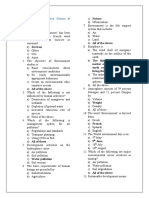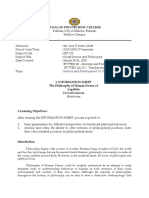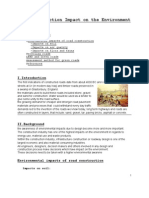100%(3)100% found this document useful (3 votes)
8K viewsMultiple Choice in Climate Change
The document contains a climate trivia quiz with 12 multiple choice questions about greenhouse gases, global warming, and their causes. The main points are:
1) Carbon dioxide is the primary greenhouse gas responsible for trapping heat and warming the planet.
2) Burning fossil fuels releases large amounts of carbon dioxide into the atmosphere and is the main driver of increased greenhouse gases from human activity.
3) When frozen ground in Arctic regions thaws due to rising temperatures, it releases trapped greenhouse gases like methane and carbon dioxide that further exacerbate global warming.
Uploaded by
Vilma SottoCopyright
© © All Rights Reserved
Available Formats
Download as DOCX, PDF, TXT or read online on Scribd
100%(3)100% found this document useful (3 votes)
8K viewsMultiple Choice in Climate Change
The document contains a climate trivia quiz with 12 multiple choice questions about greenhouse gases, global warming, and their causes. The main points are:
1) Carbon dioxide is the primary greenhouse gas responsible for trapping heat and warming the planet.
2) Burning fossil fuels releases large amounts of carbon dioxide into the atmosphere and is the main driver of increased greenhouse gases from human activity.
3) When frozen ground in Arctic regions thaws due to rising temperatures, it releases trapped greenhouse gases like methane and carbon dioxide that further exacerbate global warming.
Uploaded by
Vilma SottoCopyright
© © All Rights Reserved
Available Formats
Download as DOCX, PDF, TXT or read online on Scribd
You are on page 1/ 7
1. Which of these is the main greenhouse gas?
carbon dioxide methane CFCs
2. The difference in average global temperature
between an Ice Age and
a warm period is approximately:
1°C 6°C 60°C
3. The greenhouse gas generated by the
decomposition of waste is:
carbon dioxide methane CFCs
4. The burning of fossil fuels is the prime cause of
increased greenhouse
gases in the atmosphere.
True False
5. The only greenhouse gas that is NOT naturally
present in the
atmosphere is:
carbon dioxide methane CFCs
6. Which greenhouse gas was the first to be
regulated worldwide?
methane CFCs nitrous oxide
7. Planting trees will increase the amount of CO2 in
the atmosphere.
True False
8. The oceans show a temperature
increase before the land or air.
True False
9. Which country currently emits the most
greenhouse gases?
India China United States Canada
10. Which of these forms of transportation is
the most energy efficient?
car bus train plane
11. How long does it take for carbon dioxide in the
atmosphere to disperse?
1 year 10 years 100 years
12. Which of these gases depletes the Earth's
ozone layer?
carbon dioxide methane CFCs
1. Which of these is the main greenhouse gas?
carbon dioxide methane CFCs
2. The difference in average global temperature
between an Ice Age and
a warm period is approximately:
1°C 6°C 60°C
3. The greenhouse gas generated by the
decomposition of waste is:
carbon dioxide methane CFCs
4. The burning of fossil fuels is the prime cause of
increased greenhouse
gases in the atmosphere.
True False
5. The only greenhouse gas that is NOT naturally
present in the
atmosphere is:
carbon dioxide methane CFCs
6. Which greenhouse gas was the first to be
regulated worldwide?
methane CFCs nitrous oxide
7. Planting trees will increase the amount of CO2 in
the atmosphere.
True False
8. The oceans show a temperature
increase before the land or air.
True False
9. Which country currently emits the most
greenhouse gases?
India China United States Canada
10. Which of these forms of transportation is
the most energy efficient?
car bus train plane
11. How long does it take for carbon dioxide in the
atmosphere to disperse?
1 year 10 years 100 years
12. Which of these gases depletes the Earth's
ozone layer?
carbon dioxide methane CFCs
climate trivia
1.What is a greenhouse gas?
1. A gas produced by the infamous green housefly.
2. A gas that builds up in a greenhouse after the plants have had
one too many burritos.
3. A gas that traps heat on Earth by preventing it from returning
to space.-answer
4. A gas made famous by its ability to strip green paint off of a
house with its horrid smell.
Greenhouse gases prevent some of the energy that Earth gives
off from escaping in to space. This keeps our planet warm and
habitable. Too much greenhouse gas, though, will cause global
warming.
2. Fossil fuels, like the gas we put into our cars,
comes from:
1. The internet.
2. Cavemen dinner leftovers.
3. Organisms, mainly algae and other small life forms, that died
and were buried millions of years in the past. -answer
4. Natural history museums.
3. Which greenhouse gas is abundant in Earth's
atmosphere?
1. Cow gas
2. Carbon dioxide
3. Water vapor –water vapor
4. Goat burps
Water vapor is responsible for about 90% of the greenhouse
effect. That doesn't mean it is most responsible for human-caused
global warming, though. Humans add a lot of carbon dioxide to
the atmosphere, and this is what has been responsible for much
of our planet's recent warming. Photo credit: Kevin Dooley.
4. Why is it a good idea to turn off lights and other
electronics when you are not using them?
1. Because I told you so.
2. Because your parents might think that you are playing videos
games for a longer amount of time than you actually are. This
could lead to less video game time.
3. Because all that energy comes from somewhere, and more
likely than not it is coming from a power plant that is burning
fossil fuels.
4. Because they might get bored after a long run of shining and
beeping for nobody.
Wasting energy isn't only expensive; it is also bad for the
environment. If you leave lights and other gizmos on when you
are not using them, they are still using energy. That energy is
likely created by fossil fuels and therefore is releasing carbon
dioxide into the atmosphere. Photo credit: sdobie.
5. Which of these weather events can be worsened
by global warming?
1. Hurricanes -answer
2. Flying pigs
3. Raining cats and dogs
4. Falling sky
Global warming can increase how often extreme weather events-
like drought, wildfires, foods, tornadoes, and hurricanes-occur.
Fossil fuels, like the gas we put into our cars, comes
from:
1. Organisms, mainly algae and other small life forms, that died
and were buried millions of years in the past.
2. Natural history museums.
3. Cavemen dinner leftovers.
4. The internet.
6. As global temperatures rise, areas in the Arctic
could release even more greenhouse gas because:
1. The urge to do spring cleaning up north would be so great
that the increase in vacuum use would use up a ton of energy,
burning fossil fuels in the process.
2. The frozen ground contains greenhouse gases like methane
and carbon dioxide, and when the ground thaws, the gas
would be released.
3. Locals would burn their jackets to celebrate the milder
winters, releasing greenhouse gases.
4. Bigfoot, a notoriously gassy species, would come out of
hibernation.
A warming Earth means a lot of frozen ground will thaw. The
problem is that many places in colder regions store a lot of
greenhouse gas in that ground, and those gases could be
released if it melts. Photo credit: Jan Kratochvil.
You might also like
- Multiple Choice Practice Objective Questions and Answers On Environmental Science and Ecology80% (5)Multiple Choice Practice Objective Questions and Answers On Environmental Science and Ecology19 pages
- Environmental Science MCQs - General Science & Ability MCQs100% (2)Environmental Science MCQs - General Science & Ability MCQs11 pages
- Energy Industry Fundamentals Module 1 - InstructorNo ratings yetEnergy Industry Fundamentals Module 1 - Instructor196 pages
- Ecosystem: Structure and Function MCQ (Multiple Choice Questions and Answers)100% (2)Ecosystem: Structure and Function MCQ (Multiple Choice Questions and Answers)18 pages
- Multiple Choice Questions On Air Pollution - MCQ Biology - Learning Biology Through MCQs67% (3)Multiple Choice Questions On Air Pollution - MCQ Biology - Learning Biology Through MCQs4 pages
- 250+ TOP MCQs On Water Conservation, Rainwater Harvesting, Watershed Management and Answers100% (1)250+ TOP MCQs On Water Conservation, Rainwater Harvesting, Watershed Management and Answers5 pages
- Botany Multiple Choice Questions With Answers PDF78% (9)Botany Multiple Choice Questions With Answers PDF4 pages
- Kolmetz Handbook of Process Equipment Design Flare Systems Safety, Selection, Sizing and Troubleshooting (Engineering Design Guidelines)100% (1)Kolmetz Handbook of Process Equipment Design Flare Systems Safety, Selection, Sizing and Troubleshooting (Engineering Design Guidelines)24 pages
- MCQ On Environmental Pollution With Answers PDF100% (1)MCQ On Environmental Pollution With Answers PDF10 pages
- 2017 Climate Change Multiple Choice QuestionsNo ratings yet2017 Climate Change Multiple Choice Questions7 pages
- Environmental Science Multiple Choice Questions0% (1)Environmental Science Multiple Choice Questions2 pages
- Unit 2 Mod 3 Solid Waste Management Questions100% (3)Unit 2 Mod 3 Solid Waste Management Questions4 pages
- Air Pollution and Air Pollution Control - Quiz100% (1)Air Pollution and Air Pollution Control - Quiz2 pages
- 24 Multiple Choice Questions (MCQS) With Answers On "Natural Resources" (India)100% (1)24 Multiple Choice Questions (MCQS) With Answers On "Natural Resources" (India)12 pages
- Multiple Choice Practice Objective Questions and Answers On Environmental Science and Ecology PDF100% (2)Multiple Choice Practice Objective Questions and Answers On Environmental Science and Ecology PDF31 pages
- Multiple Choice Practice Objective Questions and Answers On Environmental Science and Ecology100% (1)Multiple Choice Practice Objective Questions and Answers On Environmental Science and Ecology31 pages
- Solid and Hazardous Waste Questions & Mark Scheme100% (4)Solid and Hazardous Waste Questions & Mark Scheme8 pages
- MCQs On Solid Waste Management and Their Types100% (1)MCQs On Solid Waste Management and Their Types4 pages
- Environmental Science MCQs - Interdisciplinary Nature of Environmental Science100% (2)Environmental Science MCQs - Interdisciplinary Nature of Environmental Science10 pages
- Environmental Science Questions and AnswersNo ratings yetEnvironmental Science Questions and Answers30 pages
- Questionnaire For Environmental Science and Related IssuesNo ratings yetQuestionnaire For Environmental Science and Related Issues6 pages
- Multiple Choice Questions On Air Pollution MCQ Biology - Learning Biology Through MCQs100% (2)Multiple Choice Questions On Air Pollution MCQ Biology - Learning Biology Through MCQs5 pages
- Question Bank Subject - Environemtnal Law Class - LL B Iii & LL B V100% (1)Question Bank Subject - Environemtnal Law Class - LL B Iii & LL B V41 pages
- Multiple Choice Questions On Environmental Issues - MCQ Biology - Learning Biology Through MCQs100% (1)Multiple Choice Questions On Environmental Issues - MCQ Biology - Learning Biology Through MCQs3 pages
- Environmental Chemistry MCQS: A) 1.6×10 Tonnes/AnnumNo ratings yetEnvironmental Chemistry MCQS: A) 1.6×10 Tonnes/Annum13 pages
- Multiple Choice Questions On Energy-Ktustudents - inNo ratings yetMultiple Choice Questions On Energy-Ktustudents - in5 pages
- Service Quality and Students' Satisfaction at Higher Learning Institutions: The Competing Dimensions of Malaysian Universities' CompetitivenessNo ratings yetService Quality and Students' Satisfaction at Higher Learning Institutions: The Competing Dimensions of Malaysian Universities' Competitiveness11 pages
- Activity 3 Social Science and Philosophy Module100% (1)Activity 3 Social Science and Philosophy Module5 pages
- Bulacan Polytechnic College: Confucianism and Taoism Philosophy of Human Person100% (3)Bulacan Polytechnic College: Confucianism and Taoism Philosophy of Human Person5 pages
- 304044204-Philosophy-of-Man-Syllabus - Obe FormatNo ratings yet304044204-Philosophy-of-Man-Syllabus - Obe Format6 pages
- Quantitative Analysis of The Consumer Perceived Value DeviationNo ratings yetQuantitative Analysis of The Consumer Perceived Value Deviation6 pages
- Service Quality Dimensions of A Philippine State UNo ratings yetService Quality Dimensions of A Philippine State U10 pages
- Social Science and Historical Perspectives: Society, Science, and Ways of KnowingNo ratings yetSocial Science and Historical Perspectives: Society, Science, and Ways of Knowing7 pages
- Measuring Service Quality and Student Satisfaction in Ahlia University, Kingdom of Bahrain During 2015-16No ratings yetMeasuring Service Quality and Student Satisfaction in Ahlia University, Kingdom of Bahrain During 2015-1656 pages
- Home Situations and Its Effect On Students Academic PerformancesNo ratings yetHome Situations and Its Effect On Students Academic Performances7 pages
- An Empirical Assessment of Customer Satisfaction ANo ratings yetAn Empirical Assessment of Customer Satisfaction A21 pages
- TCCA 90 Trichloroisocyanuric Acid TCCA Chemicals MSDSNo ratings yetTCCA 90 Trichloroisocyanuric Acid TCCA Chemicals MSDS5 pages
- Analysis of Limestone For Flue Gas Desulfurization in A Power PlantNo ratings yetAnalysis of Limestone For Flue Gas Desulfurization in A Power Plant2 pages
- Unprecedented Impacts of Aviation EmissiNo ratings yetUnprecedented Impacts of Aviation Emissi16 pages
- SENTRO Technologies Online Chemical Cleaning PresentationNo ratings yetSENTRO Technologies Online Chemical Cleaning Presentation53 pages
- Module 7 Activity No. 5 Experiment No. 7No ratings yetModule 7 Activity No. 5 Experiment No. 79 pages
- 2023-09-MSDS-BR-LEVANA-THIAMETHOXAM - 25%WGNo ratings yet2023-09-MSDS-BR-LEVANA-THIAMETHOXAM - 25%WG11 pages
- Identification of Local & Sustainable Building Methods For Residences in KeralaNo ratings yetIdentification of Local & Sustainable Building Methods For Residences in Kerala9 pages
- Storage Tanks Emissions and Emission Reductions 201312No ratings yetStorage Tanks Emissions and Emission Reductions 20131250 pages
- Green Computing Seminar Abstract 2021-2022 (2523)No ratings yetGreen Computing Seminar Abstract 2021-2022 (2523)2 pages
- Road Construction Impact On The EnvironmentNo ratings yetRoad Construction Impact On The Environment4 pages
- Acid Rain: Acid Rain Is Rain Consisting of That Are Unusually Because ofNo ratings yetAcid Rain: Acid Rain Is Rain Consisting of That Are Unusually Because of11 pages
- Multiple Choice Practice Objective Questions and Answers On Environmental Science and EcologyMultiple Choice Practice Objective Questions and Answers On Environmental Science and Ecology
- Environmental Science MCQs - General Science & Ability MCQsEnvironmental Science MCQs - General Science & Ability MCQs
- Energy Industry Fundamentals Module 1 - InstructorEnergy Industry Fundamentals Module 1 - Instructor
- Ecosystem: Structure and Function MCQ (Multiple Choice Questions and Answers)Ecosystem: Structure and Function MCQ (Multiple Choice Questions and Answers)
- Multiple Choice Questions On Air Pollution - MCQ Biology - Learning Biology Through MCQsMultiple Choice Questions On Air Pollution - MCQ Biology - Learning Biology Through MCQs
- 250+ TOP MCQs On Water Conservation, Rainwater Harvesting, Watershed Management and Answers250+ TOP MCQs On Water Conservation, Rainwater Harvesting, Watershed Management and Answers
- Kolmetz Handbook of Process Equipment Design Flare Systems Safety, Selection, Sizing and Troubleshooting (Engineering Design Guidelines)Kolmetz Handbook of Process Equipment Design Flare Systems Safety, Selection, Sizing and Troubleshooting (Engineering Design Guidelines)
- 24 Multiple Choice Questions (MCQS) With Answers On "Natural Resources" (India)24 Multiple Choice Questions (MCQS) With Answers On "Natural Resources" (India)
- Multiple Choice Practice Objective Questions and Answers On Environmental Science and Ecology PDFMultiple Choice Practice Objective Questions and Answers On Environmental Science and Ecology PDF
- Multiple Choice Practice Objective Questions and Answers On Environmental Science and EcologyMultiple Choice Practice Objective Questions and Answers On Environmental Science and Ecology
- Environmental Science MCQs - Interdisciplinary Nature of Environmental ScienceEnvironmental Science MCQs - Interdisciplinary Nature of Environmental Science
- Questionnaire For Environmental Science and Related IssuesQuestionnaire For Environmental Science and Related Issues
- Multiple Choice Questions On Air Pollution MCQ Biology - Learning Biology Through MCQsMultiple Choice Questions On Air Pollution MCQ Biology - Learning Biology Through MCQs
- Question Bank Subject - Environemtnal Law Class - LL B Iii & LL B VQuestion Bank Subject - Environemtnal Law Class - LL B Iii & LL B V
- Multiple Choice Questions On Environmental Issues - MCQ Biology - Learning Biology Through MCQsMultiple Choice Questions On Environmental Issues - MCQ Biology - Learning Biology Through MCQs
- Environmental Chemistry MCQS: A) 1.6×10 Tonnes/AnnumEnvironmental Chemistry MCQS: A) 1.6×10 Tonnes/Annum
- Multiple Choice Questions On Energy-Ktustudents - inMultiple Choice Questions On Energy-Ktustudents - in
- Service Quality and Students' Satisfaction at Higher Learning Institutions: The Competing Dimensions of Malaysian Universities' CompetitivenessService Quality and Students' Satisfaction at Higher Learning Institutions: The Competing Dimensions of Malaysian Universities' Competitiveness
- Bulacan Polytechnic College: Confucianism and Taoism Philosophy of Human PersonBulacan Polytechnic College: Confucianism and Taoism Philosophy of Human Person
- Quantitative Analysis of The Consumer Perceived Value DeviationQuantitative Analysis of The Consumer Perceived Value Deviation
- Service Quality Dimensions of A Philippine State UService Quality Dimensions of A Philippine State U
- Social Science and Historical Perspectives: Society, Science, and Ways of KnowingSocial Science and Historical Perspectives: Society, Science, and Ways of Knowing
- Measuring Service Quality and Student Satisfaction in Ahlia University, Kingdom of Bahrain During 2015-16Measuring Service Quality and Student Satisfaction in Ahlia University, Kingdom of Bahrain During 2015-16
- Home Situations and Its Effect On Students Academic PerformancesHome Situations and Its Effect On Students Academic Performances
- An Empirical Assessment of Customer Satisfaction AAn Empirical Assessment of Customer Satisfaction A
- TCCA 90 Trichloroisocyanuric Acid TCCA Chemicals MSDSTCCA 90 Trichloroisocyanuric Acid TCCA Chemicals MSDS
- Analysis of Limestone For Flue Gas Desulfurization in A Power PlantAnalysis of Limestone For Flue Gas Desulfurization in A Power Plant
- SENTRO Technologies Online Chemical Cleaning PresentationSENTRO Technologies Online Chemical Cleaning Presentation
- Identification of Local & Sustainable Building Methods For Residences in KeralaIdentification of Local & Sustainable Building Methods For Residences in Kerala
- Storage Tanks Emissions and Emission Reductions 201312Storage Tanks Emissions and Emission Reductions 201312
- Acid Rain: Acid Rain Is Rain Consisting of That Are Unusually Because ofAcid Rain: Acid Rain Is Rain Consisting of That Are Unusually Because of





































































































